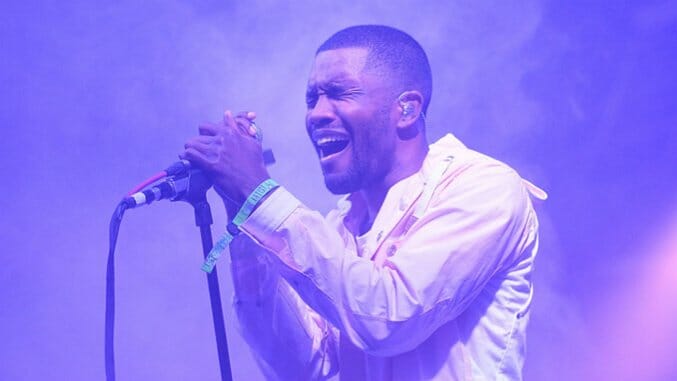Frank Ocean is the Unapologetic Prophet of America’s New Masculinity

Critics search by land and sea for the elusive “significance” of Frank Ocean’s career because we’ve hardly seen anything quite like it in pop culture: a son of New Orleans embarks on a career in music in Los Angeles after Hurricane Katrina floods his recording studio. He joins a rap collective called Odd Future that looks like the second-coming of Wu Tang, releases a critically acclaimed album (Channel ORANGE), and rises to fame with a series of stellar guest appearances with rap’s elite (“No Church In The Wild,” “Made In America”, “Oceans”). He comes out as having fallen in love with a man, disappears musically for four years, and then releases a glut of material in mid-2016 after a series of false starts and teases.
This is not the album-a-year pace of Jay Z in the 1990s. It isn’t the manic output of Lil’ Wayne in the 2000s. And it certainly isn’t Drake’s consistent dominance of the Billboard 100 in the 2010s. Ocean’s rollout of Endless and Blond indicates a new school approach to creative work in a digital age.
By releasing the extended music video Endless as an iTunes exclusive to satisfy his contractual obligations with Def Jam, Ocean didn’t wrestle free from his record label so much as he outmaneuvered them. The gambit allowed Ocean to dispense his album Blond a day later on Apple Music without the interference of his old record label, and therefore increased his profit share of Blond from a paltry 14% to a robust 70%. Ocean had his freedom. Fans had an abundance of new material from Ocean. And Def Jam had a 45-minute music video that it couldn’t efficiently monetize (Endless), as well as absolutely no part of the profits of one of the most anticipated albums of the year (Blond).
This was weapons-grade cunning: the kind of scheming seldom seen since the days mid-century jazz legends recorded with fake names and different instruments to avoid being detected by the labels they were under contract with, or when Miles Davis recorded four separate albums of material in only two days to dump Prestige Records for Columbia Records. Coincidentally, the music of Endless and Blond contains allusions to greats from the past.
Ocean’s famed falsetto will never fail to garner comparisons to Michael Jackson. Ocean coyly references The King of Pop while performing alongside The Queen of Pop—
Beyoncé—on the Blond track “Pink + White.” Though Ocean (28) is four years older than he was when he first rose to national prominence with the 2012 album Channel ORANGE, his vocals still contain a dash of ‘90s teen heartthrob Tevin Campbell’s sweetness, particularly on the pitched-up vocals of “Nikes.” And the first song of Endless is a cover of The Isley Brothers’ 1976 “At Your Best,” a song resurrected by Aaliyah’s 1994 rendition. The title Endless may as well refer to the rich continuum of black music in which Ocean stakes his claim.
This isn’t to say that the sounds of Blond and Endless are not fresh. The songs “Solo,” “Skyline To,” and “Self Control” elude clean categorization, as Ocean switches effortlessly from slickly rapped lines to sultry melodies and back. Music critic Mark Fisher has observed a similar tendency in Canadian rapper/singer Drake’s music. “Drake’s signature move [is] the transition from rap to singing, the slipping down from ego-assertion into a sensual purring,” wrote Fisher in his stellar 2013 review of Drake’s Nothing Was The Same. In “Skyline To,” Ocean inserts rapid rapping into short spaces left by the brief absence of the sung bars; the androgynous aural attack introduces the excitement of the moment (“Wanna get soaked?/ Wanna film a tape on the speed boat?”) to the sad fact that it is already fleeting (“It begins to blur we get older,/ Summer’s not as long as it used to be”).
-

-

-

-

-

-

-

-

-

-

-

-

-

-

-

-

-

-

-

-

-

-

-

-

-

-

-

-

-

-

-

-

-

-

-

-

-

-

-

-








































